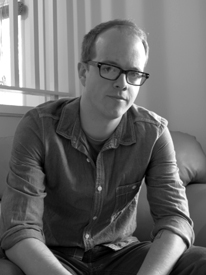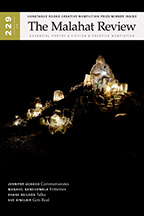On Poetry and Mental Junk:
Joseph Leroux in Conversation with Danny Jacobs
 Malahat fiction board intern Joseph Leroux
talks with Danny Jacobs about "Fatberg," winner of the 2016 P.K. Page Founders' Award for Poetry. This $1000 prize is given to the author of the best poem or sequence of poems to have appeared in the Malahat during the previous calendar year. This year's judge was John Reibetanz. "Fatberg" was originally published in Issue #190, Spring 2015.
Malahat fiction board intern Joseph Leroux
talks with Danny Jacobs about "Fatberg," winner of the 2016 P.K. Page Founders' Award for Poetry. This $1000 prize is given to the author of the best poem or sequence of poems to have appeared in the Malahat during the previous calendar year. This year's judge was John Reibetanz. "Fatberg" was originally published in Issue #190, Spring 2015.
You’ve written a lot of poems about middle-class working life, the most obvious being the call centre poems, like “What the Walls Said.” With “Fatberg,” the theme of work continues, shifting onto a new subject, one which also comes with its own esoteric language. Why do you think you revisit languages of work in your poems?
Specific fields of work each carry their own little jargons and language pockets. Call centres were interesting to explore poetically because they’re a microcosm of acronyms and business argot. Work (jobs outside of writing) has been, I think, very fruitful for many writers for this reason—the insider slang, the terminology, the sometimes beautiful institutionalized language, the on-the-job machinery that creates its own linguistic machinery inside of the poems. One revisits languages of work for that idiomatic specificity—the cool sounds outside everyday speech.
You’re mining something foul in “Fatberg,” looking for the way it sounds. How important are the sonic qualities of words to you when you are composing?
Very. There’s a certain type of successful poem that I can’t do— seemingly prosy or plain on the surface but, upon closer inspection, earns every word. Poems by Jane Kenyon, for example. After finishing one of her better poems, I think, “How did she do that? There was no flashbang diction. No highwire turns.” I can’t do that. So instead, I often try to torque the poem through sonic effects. Perhaps I lack the subtlety so I have to drop in words like “Cthulhu.” That’s the pleasure, though: I’m like, “Right on! I got Cthulhu in a poem!” It’s probably a bit of a crutch for me—I can push it too far, get lost in all that noodling.
While “Fatberg” isn’t narrative, it does take us on a journey from “under London” to “rooms below the sea.” With a journey like that, the dichotomy of the natural and human world begins to fade. When you wrote “Fatberg,” what were you looking to say—if anything—about the way the reader understands the place they inhabit?
There’s some ecological commentary there: a warning about all the garbage we produce and how we dispose of it. But there’s also a psychological aspect: our mental junk. And, really, a physiological part, too: the literal waste inside of us. I think all those ideas of garbage, and the garbage we can’t get rid of, are floating around the poem. But I hope the poem isn’t heavy-handed. I want the sound and rhythm of the piece to hit the reader first. I tried to strike a balance between having fun and creating disturbing juxtapositions.
Looking at the title poem of your recent chapbook, Loid, I was struck by the poem’s stripped-bare musicality. Is this the direction you find yourself interested in heading in as a poet, a more sparse one?
I love poets who write fraught little ditties, tiny things that flit along on the page and punch well above their weight. Kay Ryan comes to mind, or the smaller pieces in Heaney’s Wintering Out. I attempt a few poems like that in the new chapbook, and the middle section’s a 5-pager called “Chain-link” that’s composed of little imagistic fragments circling the symbol of chain-link fences in suburbia. But sparseness is so hard to pull off. I’m interested in heading there but I don’t know if I can make the poems follow suit.
In an interview with the Toronto Quarterly, you said that Songs That Remind Us of Factories was a collection of the best poems you had written over a five or six year period. What’s your day-to-day writing process like? What about project-to-project?
I don’t have much of a day-to-day writing process—I work full-time as a library manager so that takes up a lot of my time. And then there’s all that PVR-ed TV. You could say that during my free time I think a lot about how I should have a day-to-day writing schedule. And yet, I don’t want to push the poems—they come when they come and I try not to be too worried about it. As for project-to-project, I don’t usually let project-thinking interfere with my practice. It’s become common (perhaps due to granting bodies) to frame poetry as book-length ventures, and certainly some writers find this constructive, but one has to be careful not to let a project or thematic aim bully the poems. I have a few interests and aesthetic concerns over a period of time, but it would be detrimental to let those interests dictate what a poem will do next. My new manuscript (including poems in Loid) is concerned with suburbia but I don’t want to think, “Does this poem have enough lawn imagery in it?” every time I open the .doc. That was a little off-topic but there’s my two-cents on projects. I try to think one poem at a time, I guess.
Do you consider yourself a poet before any other kind of writer?
I think so. In the sense that I write mostly poems. Half the time I’m not so sure I consider myself a writer at all. Every time I sit at the desk, I’m still skeptical.

Joseph Leroux
* * * * * * * *









